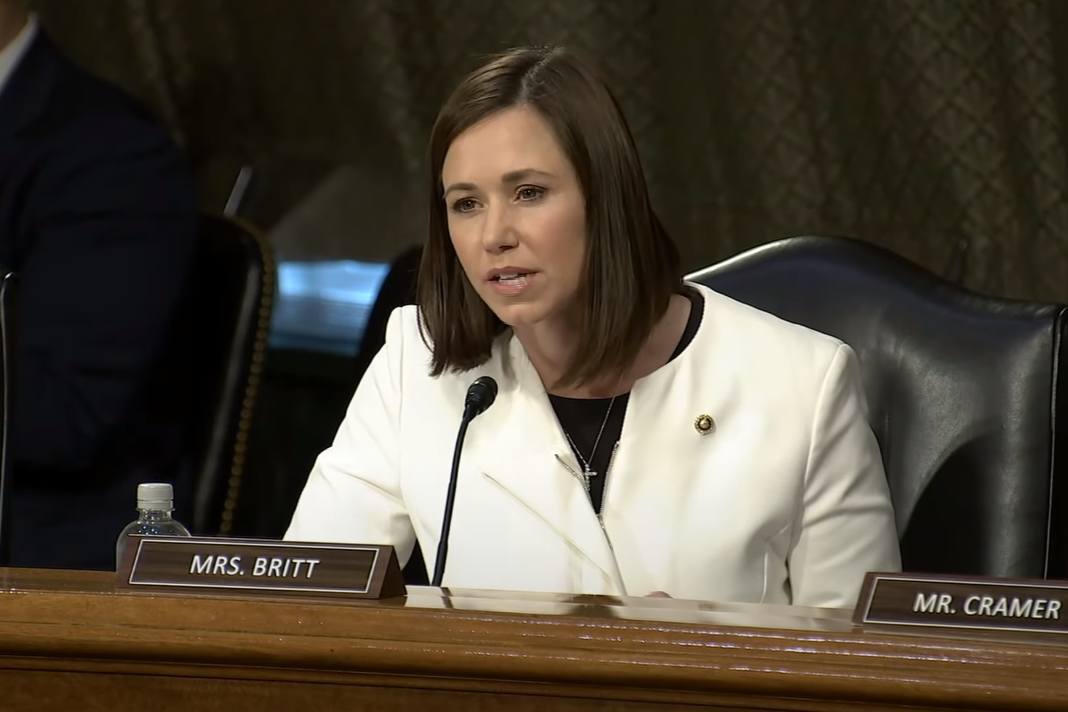U.S. Sen. Katie Britt (R-Montgomery) unrolled a pair of bipartisan bills on Wednesday designed to make child care more affordable and accessible by bolstering existing tax credits to lower childcare costs and grow the number of childcare providers.
Britt and State Sen. Tim Kaine (D-Va.) are sponsoring the Child Care Availability and Affordability Act and the Child Care Workforce Act. The pair of bills directly address the lack of childcare availability and the ever-increasing cost of procuring childcare for working families.
On Wednesday, Britt told reporters that she has personally experienced "America's broken childcare system firsthand," motivating her to pursue solutions that don't create another government entitlement program. She also pointed to childcare as a workforce issue since many mothers have had to leave the workforce entirely due to the ever-increasing costs associated with childcare.
"We had to spend an astronomical amount of money to send our daughter and our son to childcare," Britt said. "I felt like we were actually writing checks for their college tuition and not for their childcare. Today, these costs are even higher for families across Alabama and across America. When the cost of childcare is that high, parents face the question of whether or not it's financially rational to return to work, and for many, it's not even a question. It's unaffordable, and it leaves them with no realistic option."
"Our childcare package puts parents back in the driver's seat by addressing affordability and accessibility. Our legislation will save hardworking parents money."
The Child Care Availability and Affordability Act would do the following:
Increase the size of the Child and Dependent Care Tax Credit (CDCTC) and make it refundable, allowing lower-income working families with out-of-pocket childcare expenses to benefit from the credit for the first time. The proposal substantially expands the maximum CDCTC to $2,500 for families with one child and $4,000 for families with two or more children.
Strengthen the Dependent Care Assistance Program (DCAP) to allow families to deduct 50% more in expenses (up to $7,500).
Allow eligible families to benefit from the DCAP and the CDCTC when their childcare expenses exceed the DCAP threshold, which is designed for middle-income families who currently do not access the CDCTC but have particularly high childcare costs.
Bolster the Employer-Provided Child Care Tax Credit to encourage businesses to provide child care to their employees. The plan would increase the maximum credit from $150,000 to $500,000 and the percentage of expenses covered from 25% to 50%. The legislation also includes a more significant incentive for small businesses—a maximum credit of $600,000—and allows for joint applications for groups of small businesses who want to pool resources.
The Child Care Workforce Act would make it easier to access childcare by establishing a competitive grant program for states, localities, tribes and tribal organizations interested in adopting or expanding pay supplement programs for childcare workers to increase supply and reduce turnover. Within the program:
Grantees would provide supplements, paid out at least quarterly, directly to home-based and center-based childcare providers licensed by the state.
An evaluation of impacts on turnover, quality of childcare, availability of affordable childcare, and alleviating the financial burden on providers would be conducted.
According to Britt, the Child Care Availability and Affordability Act would give superior incentives to small businesses by raising the maximum tax credit to $600,000 and allowing neighboring businesses to pool resources through a joint application.
"As the daughter of two small business owners, I know how challenging it is to make ends meet," Britt said. "I know that you've got workers, you need every worker in every place, and you're really trying to not only allow your business to survive, but you want it to thrive."
She continued, "Our state is made up of main streets full of small businesses that give character to each and every community. What we want to see is we want those small businesses to thrive. We want them to be able to bring workers in and really be able to engage and be able to make an impact on those communities and we think that this will be a game changer for so many of them."
Despite the bipartisan nature of the bill package, Britt said she is being "realistic" in managing expectations in getting the package past the finish line before November's presidential election while expressing optimism on the coming discussion with a new congress and new presidential administration.
"There is a lot of conversation with regard to our tax code right now," Britt explained. "there are a lot of different ideas in this space, and there will be robust discussion, not only now, not only when we come back before the election, but truly when the new Congress and a new administration come to the White House, there will be significant dialogue about how we tackle all of these various issues moving forward. Senator Kaine and I felt that the timing was right to go ahead and put this out there, put it into the arena so people can begin to think about it."
To connect with the author of this story or to comment, email craig.monger@1819news.com.
Don't miss out! Subscribe to our newsletter and get our top stories every weekday morning.









